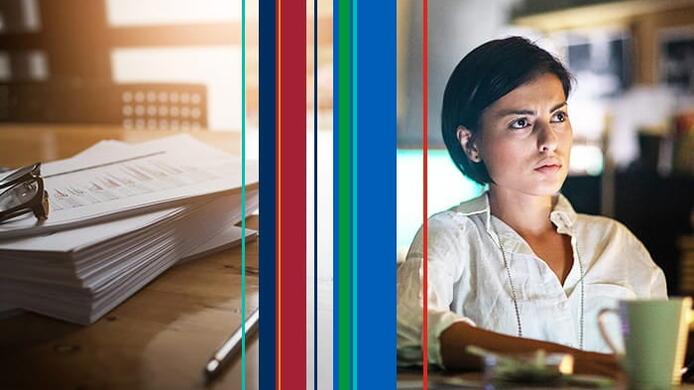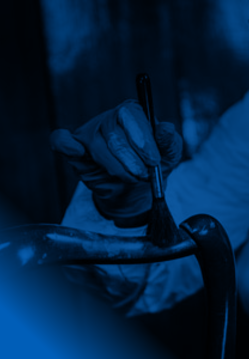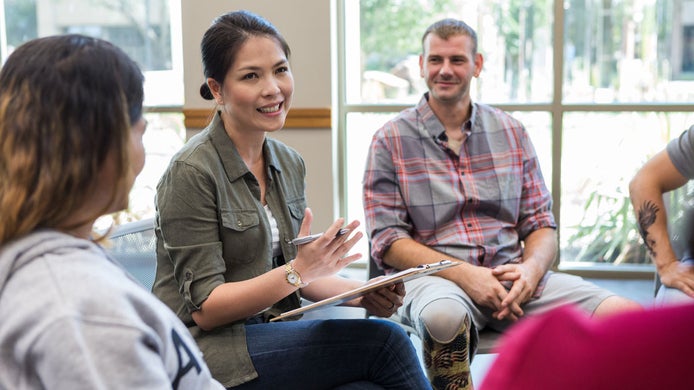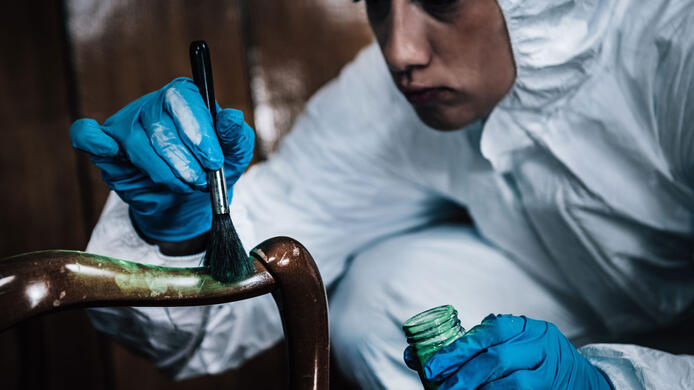Explore our resources for criminal justice and legal studies degrees and learn about career options that fit your future.

Criminal justice fascinates the public – it’s why we obsess over true crime podcasts and documentaries. While most people are happy to keep their distance by listening through headphones or watching TV screens, some envision themselves stepping up to help protect and strengthen their communities.
Perhaps you can see yourself in some of these jobs — whether in the courthouse, on patrol, or elsewhere. The good news is you have options. Criminal justice roles can involve enforcing laws, prosecuting criminals, punishing and rehabilitating offenders, and even assisting in court proceedings. No matter what aspect you’re interested in, there’s a place for you.
In fact, you may already have some of the skills that are essential for working in this sector. Whether you’re considering your professional path for the first time, you’re interested in pursuing a second career in criminal justice or you’re a military veteran seeking a transition into a civilian criminal justice role, you could jumpstart your career with a criminal justice degree.
The military is an excellent precursor to a career in criminal justice,” explains Dr. Karin Storm, associate professor of criminal justice at UMass Global. She points out the authoritarian command structure, the handling of firearms, and the wearing of uniforms as notable similarities between the two.
The vast skill set military veterans have obtained in serving their country, she adds, is one that would be valuable to any criminal justice employer. Dr. Storm highlights transferable skills such as the ability to follow executive orders, adaptability, a strong work ethic, and attention to detail. She also notes that veterans are used to working with diverse populations and, often, are very used to taking on cross-functional positions.
Common Jobs With a Criminal Justice Degree
Although far from an exclusive list, here are six careers you could pursue with a criminal justice degree.
Police Officer
An officer of the law is probably the first role that comes to mind when you think of criminal justice careers. Police officers are vital to keeping local communities safe, as they spend their shifts protecting citizens and their property. Their day-to-day duties typically include the following:
- Responding to emergencies
- Conducting traffic stops
- Collecting and securing evidence from crime scenes
- Obtaining warrants
- Writing detailed reports
- Observing and potentially arresting subjects
- Testifying in court as needed
Some officers work only on a specific type of crime, such as narcotics. Others work within specialized units, such as horseback, motorcycle, canine corps, and tactics (SWAT). Police officers, like military service members, are trained to be alert and ready to react throughout the entirety of a shift.
As a military veteran, you can draw from your experience in following executive orders, handling firearms, and working with diverse populations to excel as a police officer. The discipline, structure, and leadership skills acquired during military service often align well with the responsibilities of law enforcement. Additionally, veterans may already be familiar with tactical operations, crisis management, and rapid decision-making—skills highly valuable in policing roles.
Most police officer roles require at least a high school diploma, but many officers find that pursuing higher education can open doors for career advancement. While many officers find that a Bachelor of Arts in Applied Studies is a good fit, some pursue a Bachelor of Arts in Criminal Justice as a highly relevant option. This degree provides a strong foundation in areas like criminal law, investigative techniques, and public safety, equipping officers with specialized knowledge tailored to law enforcement roles.
Candidates must also complete a rigorous training academy to become an officer. Once on the job, police officers earn a median annual salary of $77,270, according to the Bureau of Labor Statistics (BLS).
Crime Scene Investigator
If you have any interest in crime shows, you’ve probably wondered what it’s like to be a crime scene investigator (CSI). These professionals collect and analyze physical evidence found at the crime scene such as hair, tissue, or any bodily fluids. They also can preserve less obvious evidence such as tire marks, footprints, or fingerprints.
CSIs must be meticulous about properly collecting evidence and storing it without error. These duties are all performed in the interest of providing accurate information that could assist in the acquittal or conviction of a suspect.
CSIs are often called to testify at criminal trials, which means they must maintain detailed reports and other written documentation. The best candidates to become a CSI have obtained a bachelor’s degree in criminal justice or a related field, such as forensic science or biology. Once they land the job, the BLS reports that working CSIs earn a median annual salary of $67,440.
Paralegal
If you’re interested in working behind the scenes in criminal justice, becoming a paralegal might be just the right fit for you. Paralegals support lawyers as they prepare for hearings, trials, and corporate meetings.
Though these professionals’ exact duties depend on the firm and type of law it practices, they’re often responsible for the following:
- Conducting legal research
- Investigating and gathering facts on the case
- Drafting documents
- Summarizing reports
- Accompanying lawyers to court on occasion
The work paralegals do is often critical in helping lawyers properly prepare for hearings, trials, and corporate meetings. And paralegals must be proficient with technology and basic computer software, as well, since even the inner workings of our courtrooms are becoming increasingly digital. Most paralegal positions require either an associate or bachelor’s degree in criminal justice or legal studies for paralegals, and they earn a median annual salary of $61,010.
Federal Criminal Investigator
These professionals do exactly what you would expect based on their job title — they investigate federal crimes. This involves gathering evidence, interviewing witnesses, arresting suspects, and testifying in court.
Though duties remain generally consistent among criminal investigators, the exact nature of their work depends on which federal agency they work for. Investigators working for the FBI might work cases regarding human rights violations or organized crimes. Those employed by the IRS investigate tax fraud.
Most federal agencies require investigators to obtain a bachelor’s degree in criminal justice, followed by an intensive training program at a federal facility. These criminal justice pros earn a mean annual salary of $98,770.
Probations Officer
As a probation officer, you could play an important role in rehabilitating those on probation and parole. Probation officers spend their days interviewing probationers/parolees as well as their friends and family members to gain a comprehensive understanding of the individual’s circumstances. These interviews help officers determine the best course of action for each case. They might be involved in performing drug tests, offering counseling, setting up rehab programs, and testifying in court regarding the offender’s background and progress.
Probation officers need strong communication skills to collaborate with lawyers, judges, offenders, and treatment providers. As they interact with sometimes hostile individuals and wrestle with difficult circumstances, they must possess emotional stability to perform their duties.
If you can see yourself becoming a probation officer, you’ll need a bachelor’s degree in criminal justice, social work, or behavioral science depending on the exact jurisdiction in which you hope to work. Some internship experience in the criminal justice field, such as in a courthouse, can boost your resume.
Completing training and a certification test is often required as well after you’ve accepted a job. Some probation officers may work as trainees for up to one year before they’re extended an official position. Probation officers often make a median annual salary of $64,520 per year.
Correctional Officer
Working in jails and prisons to oversee inmates, correctional officers enforce facility rules and regulations. Keeping order within jails and prisons requires the strict supervision of inmates and their activities. Correctional officer duties include escorting inmates during transport, inspecting cells for contraband items, and ensuring the facilities continually meet safety and security standards. These professionals aim to prevent disturbances, assaults, and escapes.
Correctional officers also write reports and fill out daily logs that detail inmate behavior—material that can later be used to determine if an inmate is eligible for parole or early release of any kind. While some facilities only require a high school diploma or its equivalent, most correctional officer positions—particularly in federal prisons—seek candidates with a bachelor’s degree. The median annual salary for correctional officers is $57,950, making it a stable career option with growth opportunities.
Military experience can give you a leg-up in the job search for correctional officer positions. The level of professionalism, understanding of authoritarian command structures, and commitment to physical fitness you gained as a service member are highly valued in this career path. Additionally, your skills in emergency response and conflict de-escalation make you well-equipped to handle the challenges of maintaining order and ensuring the safety of both staff and inmates within correctional facilities. These attributes contribute significantly to the safe and efficient operation of a correctional institution.
Take the First Step Toward a Criminal Justice Career
You now no longer have to wonder, “What can you do with a criminal justice degree?” There are many careers in this sector. Chances are, one intrigues you. These jobs need passionate people like you.
Stuck between two options or do all of them sound like a good fit for you? Check out our quiz below to see which role is right for you to narrow down your choice and start a career in criminal justice.
For military veterans, transitioning into a criminal justice role can be supported by numerous education benefits designed to ease the shift from military to civilian life. The Post-9/11 GI Bill, implemented in 2009, significantly increased the educational benefits available to U.S. military service members. This bill, along with additional resources, helps veterans fund their college education. These programs are founded on the belief that education plays a vital role in helping service members smoothly transition into new careers. By utilizing these benefits, veterans can pursue degrees, preparing them for fulfilling roles in law enforcement, corrections, and other criminal justice careers.
If you found a role on this list you’re interested in, it might be time to think about how you can move forward. Find out how you can take the necessary steps to qualify for these types of positions by visiting the UMass Global Bachelor of Arts in Criminal Justice degree page.








